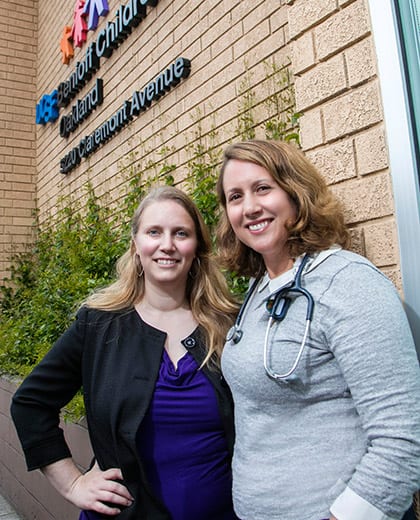MEDICAL-LEGAL PARTNERSHIP HELPS PATIENTS SECURE BASIC NEEDS FOR THEIR FAMILIES

Their work is often more vexing than vindicating, more trying than triumphant. But for Berkeley Law students who provide help—and hope—for clients of the East Bay Community Law Center’s Medical- Legal Partnership project, the experience is intensely satisfying.
The project, which liaises with three area hospitals to help patients secure basic needs to stabilize their families’ lives, recently celebrated a decade of collaboration with Oakland Children’s Hospital. “We confront the many economic and social determinants of health and their connections to poverty,” student David Nahmias ’18 says. “This project doesn’t look at law in a vacuum.”
Fluent in Spanish, Nahmias helped a mother of three—who speaks almost no English—secure overdue repairs to her rental home and reverse cuts in her food stamps allocation. “The complete trust she placed in me, and the knowledge that I’ve helped provide a more stable situation … extremely gratifying,” he says.
Doctors and social workers identify legal issues faced by patients and their families, including denial of public benefits. Although patients are often referred with a single concern, attorney Erin Le and her team of law students dig for broader solutions to their life circumstances, resulting in both direct assistance and referrals to other legal resources.
 “Many of our client families have children and adults who have experienced traumatic events or the lifelong trauma of growing up poor,” Le says. “These stressors have real health impacts.”
“Many of our client families have children and adults who have experienced traumatic events or the lifelong trauma of growing up poor,” Le says. “These stressors have real health impacts.”
Le’s group appeals and negotiates settlements for denied, terminated, or reduced public benefits; advocates on post-entitlement benefits issues; helps prepare simple wills and advance health care directives; and supports clients in pre-litigation housing matters. Students also work with medical teams to write letters of support, gather evidence, and represent clients at federal disability hearings.
“We get comprehensive training on how to handle different kinds of cases, and we have constant access to supervising attorneys who are always willing to talk through the issues,” says Emma Connolly ’18. “A common theme we see is that families feel they’re being treated like criminals and liars when really these processes are just so opaque and difficult to understand.”
Many clients are not native English speakers, making it hard for them to wade through the complex, paperwork-laden world of public benefits. Le conducts regular onsite trainings that educate patients and medical practitioners.
“This partnership has improved the health of patients we see through direct service, and educated more than 500 doctors about the special nature of legal services and how to use lawyers as consultants,” says Gena Lewis, a Children’s Hospital staff pediatrician.
Lewis’ colleague, neo-natal social worker Chela Rios-Muñoz, notes that the families involved “often operate on misinformation or fear without knowing their rights.”
“They’ve had to live in circumstances that aren’t fair, and this partnership helps to change that,” she says.
—Andrew Cohen